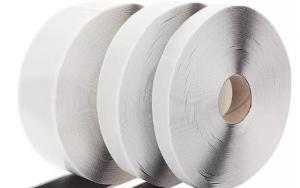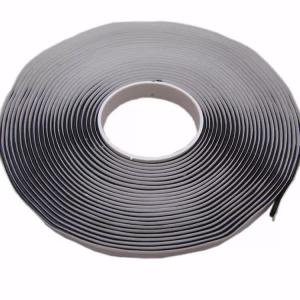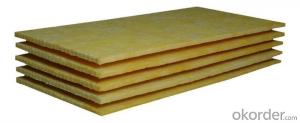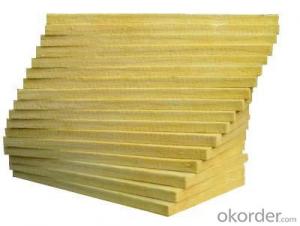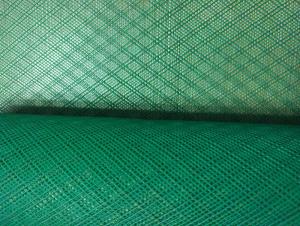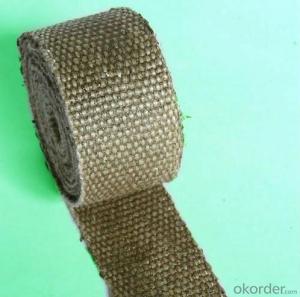Sealant Tape- fiberglass vacuum infusion process
- Loading Port:
- Shanghai
- Payment Terms:
- TT or LC
- Min Order Qty:
- 500 m²
- Supply Capability:
- 1000000 m²/month
OKorder Service Pledge
OKorder Financial Service
You Might Also Like
Sealant Tape
Product Description
Sealant tape is developed for blade and aerospace industry, yacht industry, etc. Based on advanced technology, the products have high surface adhesion force on vacuum bag and a variety of tools. In the curing cycle it has excellent seal, and very easy to remove from the cold or heating surface after the curing.
Technique Data
Adhesive: Rubber
Adhesive Side: Single Sided
Adhesive Type: Pressure Sensitive, Hot Melt
Design Printing: Offer Printing
Material: Butyl
Feature: Waterproof
Use: Carton Sealing
Type: Waterproof Membrane
BACKING: BUTYL RUBBER
TAPE COLOR: GREY/WHITE/BLACK
LINER COLOR: PAPER: WHITE
THICKNESS:0.6MM/0.8MM/1MM/1.5MM/2MM/3MM/5MM....
CUT ROLL WIDTH: 6MM/8MM/10MM/20MM/30MM/40MM/50MM...
CUT ROLL LENGTH: 10M/20M/30M/50M....
OPTION: SINGLE SIDE/DOUBLE SIDE/ALUMINUM BUTYL
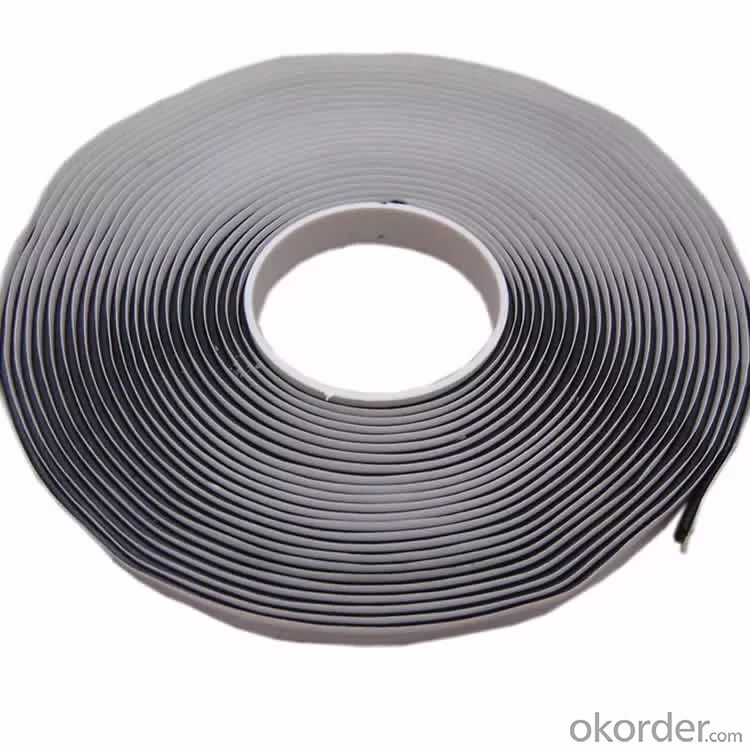
- Q: Can fiberglass mat tissue be used for flooring insulation?
- No, fiberglass mat tissue is typically not used for flooring insulation. It is more commonly used in applications such as roofing, wall insulation, and soundproofing. For flooring insulation, materials like foam, cellulose, or mineral wool are typically preferred.
- Q: What is the thickness range of fiberglass mat tissue?
- The thickness range of fiberglass mat tissue typically varies between 0.2mm to 3mm.
- Q: What are the different fabric finishes available for fiberglass mat tissue?
- Some of the different fabric finishes available for fiberglass mat tissue include plain weave, twill weave, satin weave, and leno weave. These finishes affect the appearance and texture of the tissue, as well as its strength and durability.
- Q: What are the different reinforcement orientations available for fiberglass mat tissue?
- The different reinforcement orientations available for fiberglass mat tissue include random chopped strand mat (CSM), continuous strand mat (CSM), woven roving, and unidirectional fiberglass.
- Q: Can fiberglass mat tissue be used for insulating windows?
- Yes, fiberglass mat tissue can be used for insulating windows. Fiberglass mat tissue is a lightweight and flexible material that is commonly used for insulation purposes. It has high thermal resistance and is capable of reducing heat loss or gain through windows. By placing a layer of fiberglass mat tissue on the window surface, it can help to improve the insulation properties of the window, reducing drafts and heat transfer. Additionally, fiberglass mat tissue is also effective in reducing noise transmission through windows, making it a versatile option for both thermal and acoustic insulation.
- Q: Is fiberglass mat tissue compatible with vacuum infusion processes?
- Yes, fiberglass mat tissue is compatible with vacuum infusion processes. It is commonly used in vacuum infusion techniques as it allows for the distribution of resin evenly throughout the laminate, resulting in a strong and uniform composite part.
- Q: Does fiberglass mat tissue require any special surface treatments before application?
- Special surface treatments are necessary before applying fiberglass mat tissue in order to ensure proper adhesion and bonding with the substrate. Applying a primer or bonding agent is a common treatment that enhances the bond strength between the fiberglass mat tissue and the substrate. Typically, the primer or bonding agent is applied to the substrate and allowed to dry before applying the fiberglass mat tissue. Another treatment involves removing any loose or flaking material from the substrate's surface. This can be achieved through mechanical methods like sanding or grinding, or by using a chemical treatment to dissolve or eliminate unwanted material. This step is crucial to establish a clean and smooth surface for the fiberglass mat tissue to adhere to. In certain cases, it may be necessary to roughen or etch the substrate's surface to provide a better bonding surface for the fiberglass mat tissue. The method used for roughening or etching depends on the type of substrate being used and can involve abrasives or chemical etching agents. The specific surface treatment required for fiberglass mat tissue depends on factors such as the type of substrate, desired bond strength, and application method. Following the manufacturer's instructions and recommendations for surface preparation is essential to achieve a successful application and long-lasting bond.
- Q: What are the typical roll sizes available for fiberglass mat tissue?
- The typical roll sizes available for fiberglass mat tissue vary depending on the manufacturer and the specific application. However, in general, fiberglass mat tissue is available in roll sizes ranging from 50 inches to 120 inches in width and 100 yards to 1,000 yards in length. These sizes are commonly used in industries such as construction, automotive, and marine for various purposes like insulation, reinforcement, and soundproofing. It is important to note that the availability of specific roll sizes may differ based on the supplier and the intended use of the fiberglass mat tissue.
- Q: Can fiberglass mat tissue be used in structural applications?
- Yes, fiberglass mat tissue can be used in structural applications. Fiberglass mat tissue is a lightweight and flexible material that is commonly used as reinforcement in construction and engineering. It is often used in conjunction with other materials such as resin or concrete to enhance the structural integrity of various components. The high strength-to-weight ratio of fiberglass mat tissue makes it ideal for reinforcing structures such as walls, roofs, and floors. Additionally, fiberglass mat tissue is resistant to corrosion, moisture, and chemicals, making it suitable for use in various environments. Its versatility and durability make it a popular choice in structural applications.
- Q: Glass fiber cotton or ceramic fiber paper insulation?
- When the temperature can be met, the glass fiber cotton insulation is better. The main advantage of ceramic fiber is to make gaskets and the like
Send your message to us
Sealant Tape- fiberglass vacuum infusion process
- Loading Port:
- Shanghai
- Payment Terms:
- TT or LC
- Min Order Qty:
- 500 m²
- Supply Capability:
- 1000000 m²/month
OKorder Service Pledge
OKorder Financial Service
Similar products
Hot products
Hot Searches
Related keywords
